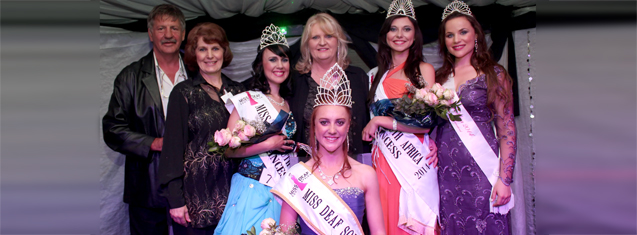
Back, from the left are: Gert en Narda Els (founders of Miss Deaf SA), Elrie du Toit (second princess), Martie Collen (organiser of Miss Deaf SA), Hermina Christi Greeff (first princess), Marissa Smith (Miss Deaf Africa 2014).
Front: Elzane van den Bergh.
The new Deaf Miss South Africa was announced – and Elzane van den Bergh, a Kovsie student, was crowned the winner. Elzane, a final-year BEd Foundation Phase student, also won the title for Best Talent at this swanky event.
Another Kovsie student, Elrie du Toit, was selected as second princess. She was also among the top five for the Best Talent title. Elrie is currently studying to become a social worker.
Twelve finalists from all over South Africa, all deaf or hard of hearing, took part.
On the competition at Miss Deaf South Africa, Elzane’s thoughts are that the judges had a very difficult choice to make. “Each talented girl had some special characteristic that stood out,” she relates.
“I really wanted to do something like this as it would help to make a bigger difference in the community and motivate people to accept themselves for who they are, because we are all uniquely created.”
Elzane’s focus is on teaching basic sign language to hearing parents with deaf babies. She also believes that hearing people should be made more aware of the deaf culture and language. This will eventually lead to deafness no longer being perceived as a disability.
Hard work and preparations are now lying ahead for Miss Deaf World, which will be held in Prague during June next year.
“Never allow any disability or obstacle to stand in the way of your dreams,” says Elzane. “Stick it out and don’t doubt in your abilities for one second, because you were born to be a winner. Be proud of yourself, no matter what.”